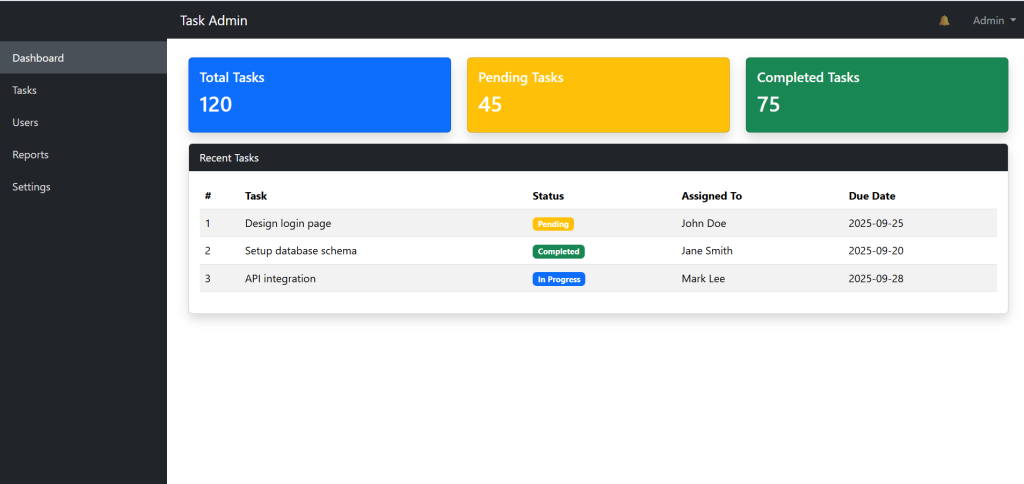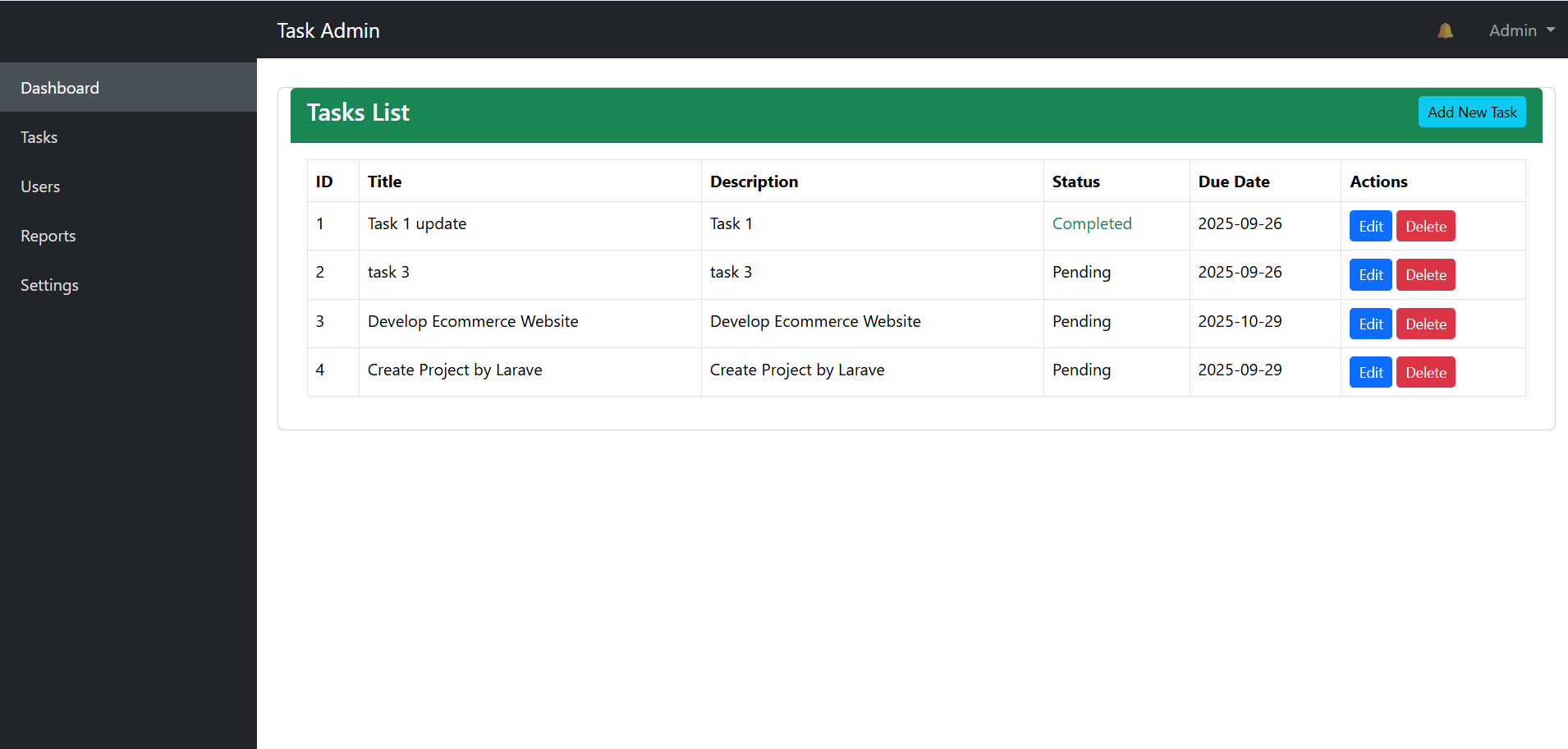In these post we cover all concept of Laravel framework starting from stratch to deployment with videos.
1. Prerequisites
Before starting, make sure you have installed:
- PHP (>= 8.1 recommended),Composer (PHP dependency manager)
- MySQL (for database)
- Vscode for code editors.
2. Create New Laravel Project
# Install Laravel globally (if not already installed)
composer global require laravel/installer
# Create new project
laravel new task-manager
# Or using composer
composer create-project laravel/laravel todoapp
change folder to the project
cd todoapp3. Configure Database
Open .env file and set your database details:
DB_CONNECTION=mysql
DB_HOST=127.0.0.1
DB_PORT=3306
DB_DATABASE=task_manager
DB_USERNAME=root
DB_PASSWORD=rootAfter that create database
mysql -u root -p
CREATE DATABASE todo_app_db;4. Create Task Model and Migration
php artisan make:model Task -m
public function up(): void
{
Schema::create('tasks', function (Blueprint $table) {
$table->id();
$table->foreignId('user_id')->constrained()->onDelete('cascade'); // task belongs to user
$table->string('title');
$table->text('description')->nullable();
$table->boolean('is_completed')->default(false);
$table->timestamps();
});
}
Run migration:
php artisan migrate
5. Create Controller and Routes
php artisan make:controller TaskController --resource
In routes/web.php:
<?php
use Illuminate\Support\Facades\Route;
use App\Http\Controllers\TaskController;
use App\Http\Controllers\UserController;
use App\Http\Controllers\RoleController;
Route::get('/', function () {
return view('welcome');
});
Route::resource('tasks', TaskController::class);
Route::get('dashboard', [TaskController::class,'dashboard'])->name('dashboard');
Route::resource('users', UserController::class);
Route::resource('roles',RoleController::class);
6. Implement Task Controller Logic
Create all task performing logics
<?php
namespace App\Http\Controllers;
use Illuminate\Http\Request;
use App\Models\Tasks;
class TaskController extends Controller
{
/**
* Display a listing of the resource.
*/
public function index()
{
//
$tasks=Tasks::all();
return view('tasks.index',compact('tasks'));
}
public function dashboard()
{
return view('tasks.dashboard');
}
/**
* Show the form for creating a new resource.
*/
public function create()
{
//
return view('tasks.new');
}
/**
* Store a newly created resource in storage.
*/
public function store(Request $request)
{
//
$task=new Tasks();
$task->title=$request->title;
$task->description=$request->description;
$task->completed=false;
$task->save();
return redirect()->route('tasks.index');
}
/**
* Display the specified resource.
*/
public function show(string $id)
{
//
$tasks = Tasks::find($id);
return view('tasks.show', compact('tasks'));
}
/**
* Show the form for editing the specified resource.
*/
public function edit($id)
{
//
$tasks = Tasks::find($id);
return view('tasks.edit', compact('tasks'));
}
/**
* Update the specified resource in storage.
*/
public function update(Request $request, string $id)
{
//
$task = Tasks::find($id);
$task->title = $request->title;
$task->description = $request->description;
$task->completed = $request->has('completed');
$task->save();
return redirect()->route('tasks.index')->with('success', 'Task updated successfully');
}
/**
* Remove the specified resource from storage.
*/
public function destroy(string $id)
{
//
$task = Tasks::find($id);
$task->delete();
return redirect()->route('tasks.index')->with('success', 'Task deleted successfully');
}
}
7. Create Blade Views
create folder tasks on resource/views/tasks.
Inside tasks create file index.blade.php
<x-layout>
<div class="row mb-4">
</div>
<div class="col-12">
<h2 class="mb-4">Tasks</h2>
</div>
</div>
<div class="row">
<div class="col-12">
<div class="card">
<div class="card-header d-flex justify-content-between align-items-center">
<span>All Tasks</span>
<a href="{{ route('tasks.create') }}" class="btn btn-sm btn-primary">Add New Task</a>
</div>
<div class="card-body">
<table class="table table-hover">
<thead>
<tr>
<th>Title</th>
<th>Description</th>
<th>Status</th>
<th>Created At</th>
<th>Actions</th>
</tr>
</thead>
<tbody>
@foreach($tasks as $task)
<tr>
<td>{{ $task->title }}</td>
<td>{{ $task->description }}</td>
<td>
@if($task->completed)
<span class="badge bg-success">Completed</span>
@else
<span class="badge bg-warning text-dark">Pending</span>
@endif
</td>
<td>{{ $task->created_at->format('M d, Y') }}</td>
<td>
<a href="{{ route('tasks.edit', $task->id) }}" class="btn btn-sm btn-secondary">Edit</a>
<a href="{{ route('tasks.show', $task->id) }}" class="btn btn-sm btn-info">Show</a>
<form action="{{ route('tasks.destroy', $task->id) }}" method="POST" class="d-inline">
@csrf
@method('DELETE')
<button type="submit" class="btn btn-sm btn-danger" onclick="return confirm('Are you sure?')">Delete</button>
</form>
</td>
</tr>
@endforeach
</tbody>
</table>
</div>
</div>
</div>
</div>
</div>
</x-layout> List all tasks

Create file ,new, edit, and show.blade.php
Deployment
Deploy on Shared Hosting / cPanel
- Upload project files via File Manager or Git.
- Move all Laravel files into
yourdomain.com/orsubdomain/. - Place contents of
public/folder into root (public_html/) and updateindex.phppaths. - Set
.envwith production DB credentials. - Run migrations:
Now you have a full Task Management / Todo-App built with Laravel — from scratch to deployment.

